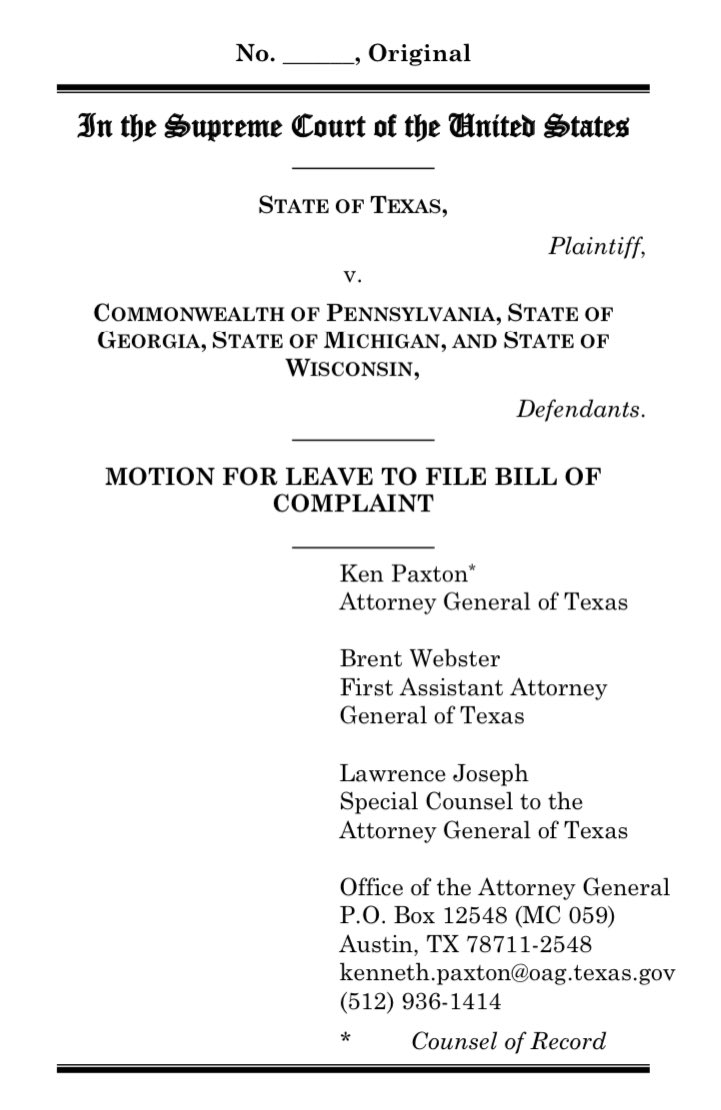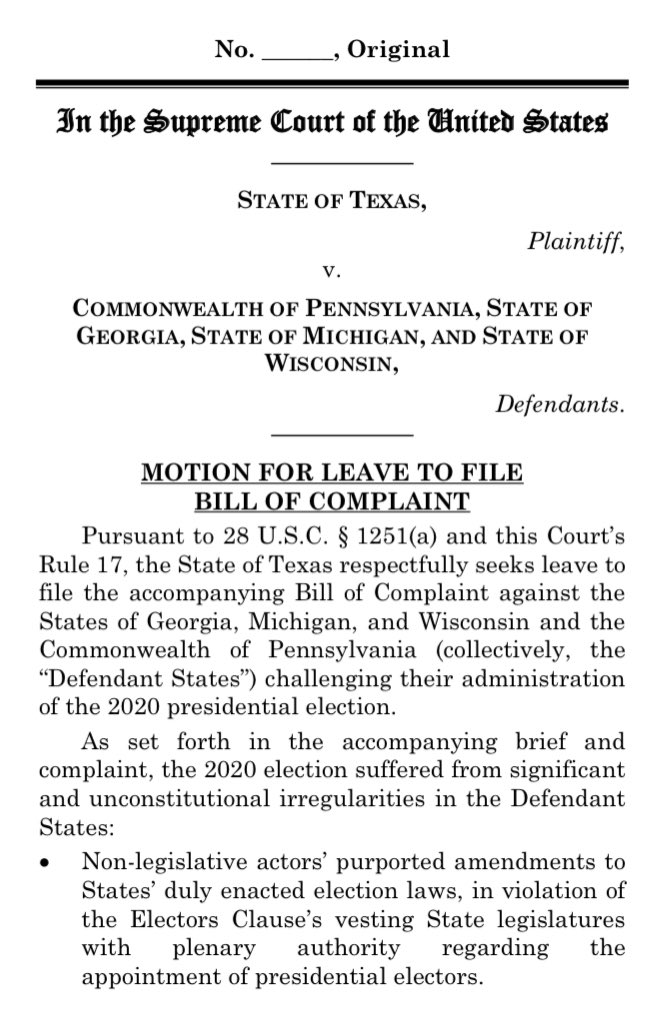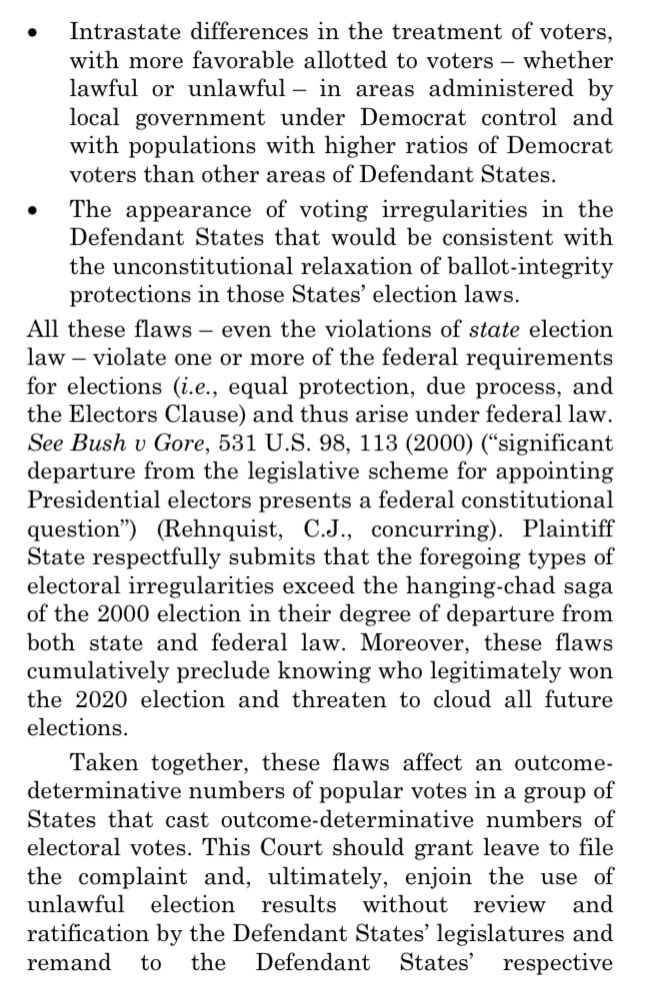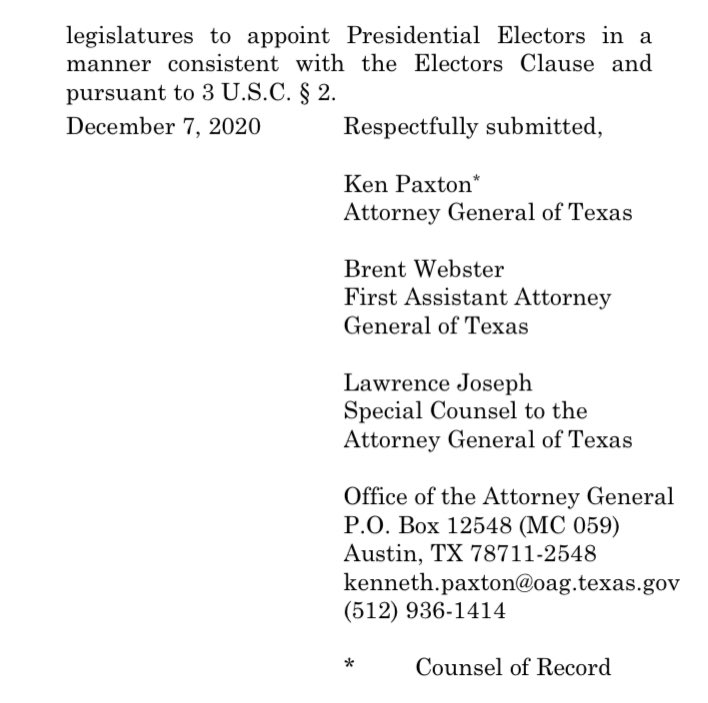
1. A lot of reactions today to Justice Alito moving up the deadline for PA to respond to @MikeKellyPA's application for an emergency injunction to throw out PA's certification of its presidential electors.
Here's a quick #thread on why none of this matters—or is going to matter:
Here's a quick #thread on why none of this matters—or is going to matter:
2. First, there's the obvious point: Even if this gambit somehow succeeds (spoiler: it won't), the worst-case scenario is that PA's electoral votes get tossed.
In that case, Biden would *still* receive 286 electoral votes when the Electoral College votes on 12/14. He needs 270.
In that case, Biden would *still* receive 286 electoral votes when the Electoral College votes on 12/14. He needs 270.
3. Now, let's get to why the Kelly suit isn't going anywhere. First, it was dismissed by the PA Supreme Court based upon a state procedural bar ("laches"). #SCOTUS does not have jurisdiction to review state court decisions that rest on such "independent and adequate" state rules.
4. But even if we could get past that, and #SCOTUS were to decide to reach the merits at this stage (never mind that the PA Supreme Court *didn't*), it's worth stressing just how crazy Kelly's two substantive arguments are (and how little they'll resonate even with *this* Court).
5. Kelly's suit is basically a frontal assault on *all* mail-in voting in PA. But to get to #SCOTUS, he needs *federal* objections. And he has two. The second one is just silly—that the PA Supreme Court's holding that his suit came too late ("laches") violates due process.
6. Even if there was anything to this (and there isn't; due process doesn't mean you can sue whenever you want), that's not actually a basis to undo PA's certification; it's just an argument that the PA Supreme Court should have decided Kelly's constitutional claim on the merits.
7. So let's get to that claim. At its core, Kelly is challenging "Act 77"—a 2019 law enacted by the (Republican-led) PA legislature that dramatically expanded mail-in voting. Critically, the PA Supreme Court has *already* held that Act 77 is *consistent* with the PA Constitution.
8. Kelly's argument is that Act 77 violates the *U.S.* Constitution *because* it violates the *PA* constitution. But whether a state law violates the state constitution is up to the *state* supreme court, not #SCOTUS. And the PA Supreme Court has already upheld Act 77...
9. In that respect, this is the *opposite* of the (still-pending) challenge to late-arriving mail-in ballots. There, the argument is that, *because* the PA legislature didn't authorize late-arriving mail-in ballots, the PA Supreme Court violated the U.S. Constitution by doing so.
10. Even if there is merit to that argument (which a majority of #SCOTUS has never embraced), it's predicated on the idea that state courts can't override state legislatures when it comes to federal elections.
But here, Kelly is challenging what the state *legislature* did.
But here, Kelly is challenging what the state *legislature* did.
11. All the PA Supreme Court did was to hold that the state legislature didn't violate the state constitution in expanding mail-in voting. But the U.S. Constitution has *nothing to say* about how state courts enforce their own constitutions against state legislatures. Full stop.
12. If there is no "there" there, then why is Alito indulging Kelly by ordering PA to respond, now before the safe-harbor deadline?
My best guess is to avoid claims that he deliberately ran out the clock (including from his colleagues). That doesn't mean an injunction is coming.
My best guess is to avoid claims that he deliberately ran out the clock (including from his colleagues). That doesn't mean an injunction is coming.
13. And that's for 3 reasons:
● It's not going to matter (PA isn't the tipping-point);
● The Court doesn't have the jurisdiction to issue it; &
● The constitutional theory underlying the suit is the *opposite* of what the conservative Justices have been arguing for.
/end.
● It's not going to matter (PA isn't the tipping-point);
● The Court doesn't have the jurisdiction to issue it; &
● The constitutional theory underlying the suit is the *opposite* of what the conservative Justices have been arguing for.
/end.
14. One correction: The PA Supreme Court has *not* resolved a facial challenge to Act 77's expansion of mail-in voting (it's rejected *other* challenges to Act 77). That doesn't change anything, because whether Act 77 violates the PA Constitution is still a question of *PA* law.
• • •
Missing some Tweet in this thread? You can try to
force a refresh









